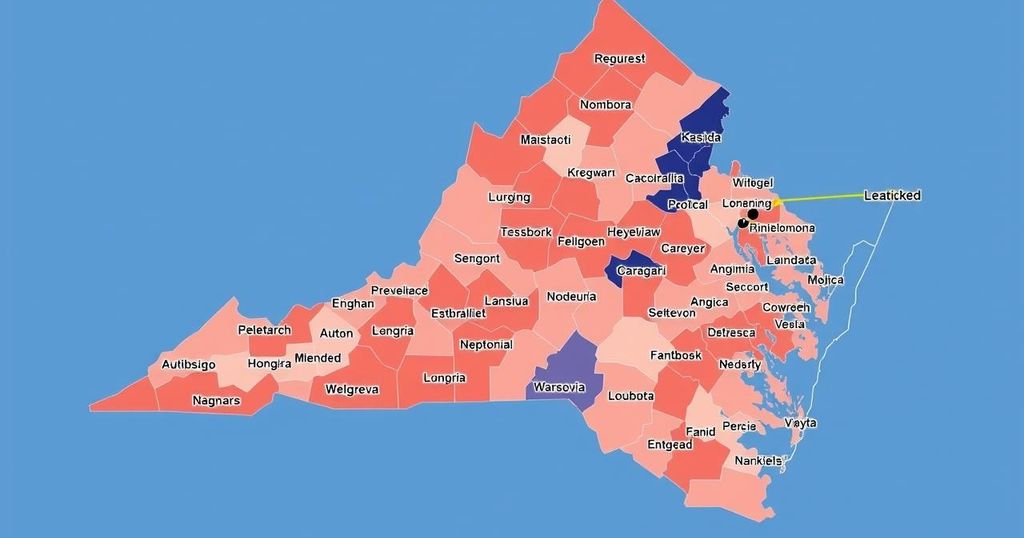World news
AFRICA, DEMOCRATS, ELECTION, GLENN YOUNGKIN, HOUSE OF, KANNAN SRINIVASAN, LEGISLATION, LOUD, LOUDOUN COUNTY, NORTH AMERICA, PRESIDENTIAL CANDIDATES, PRESIDENTIAL ELECTION 2024, REPRODUCTIVE RIGHTS, REPUBLICAN, REPUBLICANS, RICHMOND, SENATE, SOUTH AFRICA, SUB, TU, UNITED STATES, VA, VIRGINIA, YOUNGKIN
Oliver Grayson
0 Comments
Upcoming Special Elections in Virginia: Key Issues and Candidate Dynamics
Special elections in Loudoun County and central Virginia on Tuesday will determine two state senators and a House delegate, with implications for the balance of power in the legislature. Democrats currently hold a narrow majority, and Republican victories could signal a shift in governance, all while candidates present vastly different positions on key issues like abortion and education.
On Tuesday, voters in Loudoun County and parts of central Virginia will participate in special elections to select two state senators and a member of the House of Delegates, coinciding with the commencement of the General Assembly session. Republican candidates aspire to gain control of the state legislature by possibly flipping two key seats in Loudoun County; however, this outcome is deemed unlikely due to the area’s strong Democratic presence.
Political analysts similarly predict little opportunity for Democrats to enhance their slender Senate majority by winning the vacated seat of McGuire in a predominantly rural area transitioning from Richmond to Lynchburg. Nevertheless, special elections, often characterized by low voter turnout and conducted outside the conventional election cycle, can occasionally yield unexpected results, which could become crucial for Republican Governor Glenn Youngkin’s agenda in his last year in office.
Since Governor Youngkin assumed office in January 2022, Democrats have maintained control of the Senate without substantial opposition to the governor’s legislative priorities following their takeover of the House in 2023. A narrow majority in the Senate could shift, particularly if the Democrats are unable to secure a seat following the exit of Subramanyam, as the Republican Lt. Governor, Winsome Earle-Sears, possesses the authority to cast tie-breaking votes.
In the House, Democrats currently hold a slim majority of 51-to-49, which may be jeopardized by the resignation of Delegate Kannan Srinivasan from Loudoun County. Furthermore, early in-person voting for these elections concluded on Saturday, with polls open on Tuesday from 6 a.m. to 7 p.m.
The contest in Loudoun involves Srinivasan, who is striving to ascend from the House to the Senate, facing off against Tumay Harding, a former teacher and vocal critic of the county’s educational policies. The divergent positions on abortion highlight their contrasting platforms; Srinivasan pledges to uphold reproductive rights, while Harding advocates for more restrictive measures.
For the House seat being vacated by Srinivasan, Democrat JJ Singh and Republican Ram Venkatachalam are running against each other. Singh, a businessman and advocate for progressive policies including stricter gun control, is battling Venkatachalam, who promotes a traditional Republican agenda focused on economic improvement and quality education. In the central Virginia contest, Republican Luther Cifers and Democrat Jack Trammell will compete for the Senate seat vacated by McGuire, each with unique backgrounds and policy priorities aimed at addressing regional issues.
The article focuses on the special elections held in Loudoun County and central Virginia, significant as they come just before a new General Assembly session. The elections are particularly meaningful as they may shift the balance of power within Virginia’s legislature, which has been under Democratic control since Governor Youngkin took office. Special elections such as these often produce unpredictable outcomes, which adds layers of intrigue to the political landscape leading up to legislative sessions. Furthermore, the candidates representing differing political ideologies reflect the broader national conversation about governance, social issues, and local priorities.
In summary, the special elections taking place in Loudoun County and central Virginia could significantly impact the state’s legislative dynamics, particularly for Governor Youngkin’s administration. While Republican candidates attempt to gain ground in a solidly Democratic region, the likelihood of achieving major gains remains uncertain. Ultimately, these elections serve as a critical juncture for state governance and the political future of Virginia.
Original Source: www.washingtonpost.com




Post Comment